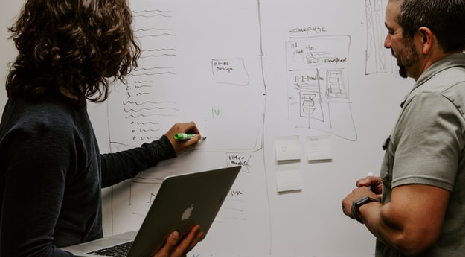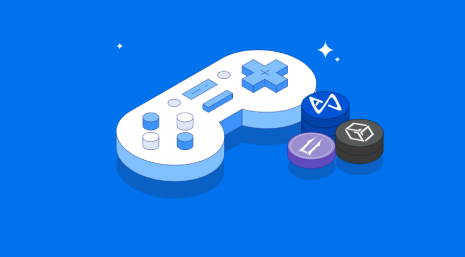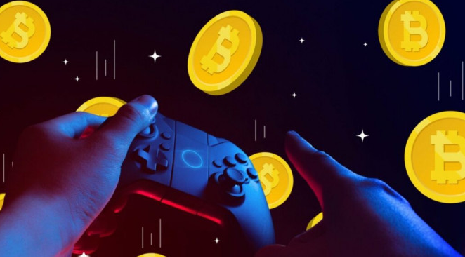share
Today, the crypto market looks very different than it did in the early 2010s. Cryptocurrencies like Bitcoin and ETH have taken deep roots in various industries. Nowadays, many people are trying to earn crypto one way or another. Some opt for investments, others go for auctions, and some play to earn crypto.
Monetization for players in the form of virtual assets and non-fungible tokens (NFTs) is one of the most exciting gaming developments nowadays.
Since play-to-earn (P2E) games usually have crypto and NFTs as integral parts of their system, they possibly raise profit and excitement.
Furthermore, in-game earnings could be used to buy new characters, weapons, and even real estate in the gaming world. Selling or trading all of these assets could be a real possibility, further enhancing the excitement factor.
You may think that it’s a scam or simply impossible. But play-to-earn (P2E) games really do exist and have made every gamer’s dream come true. But it’s not just the gamers who’re rejoicing. Nowadays, there are more and more developers entering the crypto play-to-earn games field.
You may have an excellent idea for a play-to-earn game but not know where to start. That’s why we’ve provided this complete guide.

Play-to-Earn (P2E) Games
Play-to-earn crypto games are a creative twist on traditional video games; they allow gamers to gain in-game items by winning matches, accomplishing missions, and selling or buying assets.
Most play-to-earn crypto games support trading in-game assets for more popular coins, such as Bitcoin and ETH, via a cryptocurrency exchange.
P2E games generally allow players to play without paying anything upfront. However, some need an initial payment (e.g., to purchase an avatar or land). These fees are usually low in comparison to the income potential they offer, but they are essentially a risky asset.
Due to the enormous size of the broader metaverse, no NFT gaming guide could possibly cover every potential compensation.
Nevertheless, the currencies listed below reflect some of the basic rewards found in most P2E games. Generally, play-to-earn games’ currencies come in two different categories:
1. Native Cryptocurrency
Usually, crypto games use a distinctive, native coin. Their mechanism is quite similar to established cryptocurrencies like ETH and Bitcoin. Developers will need to develop coins, build a blockchain project, and use smart contracts to seal the deal. In essence, these coins function like standard in-game currency. But, unlike in-game coins, they have actual value outside the game.
The prime example is an NFT game called Axie Infinity, which utilizes two separate native coins, AXS and SLP. These coins may be sold at exchanges for other cryptocurrencies or fiat money, like ETH. The key distinction between a native cryptocurrency and an in-game currency is that developers can produce a native cryptocurrency themselves.
2. Established Coins
The second strategy is for developers to use well-established coins like Bitcoin, ETH, Solana, and many others that already exist in the market. That’s why many games like Bitcoin Tycoon are named after these cryptocurrencies, and many more have the word “crypto” in the title.
Even if some well-known coins are used to reward participants in these crypto games, it might take some time to amass a sizable sum. In other words, the money is real, but the process will surely take a long time.
How Developers Can Make Money
Regardless of the economic climate, profitability is a characteristic common to all crypto game players. Play-to-earn games are inherently profitable in several ways. The main benefit is that players may earn money while having fun. Users may have a satisfying and interactive experience with this game type. Games with physical prizes are, by nature, more entertaining.
Of course, it’s not just gamers. The P2E approach also benefits developers in two main ways:
Transaction Fees
Developers charge a transaction fee when a player registers to use a P2E gaming platform in order to buy in-game digital money. In general, that is how game developers make money. The native currency’s value increases as more people buy it, which is helpful both for gamers and developers.
In-Game Items
In online games like Fortnite, developers sell skins to their players. These help players blend into the game’s environment. With the advent of blockchain gaming, developers no longer have to be the seller to get a cut of the profits.
Instead, they can support the market where people trade assets on the blockchain. Wherever an in-game asset is sold, the blockchain records the transaction and collects a modest fee that is returned to the developer. In other words: When players trade their weapons, skins, or parcels of land on the blockchain, developers will get a portion of the profits.
Typically, these items are offered for sale as NFTs, which is why many creators have integrated them into their game designs. This gives gamers extra real-world value since they can exchange those NFTs and make a profit.
Why Use Non-Fungible Tokens (NFTs)?
Most play-to-earn crypto games extensively use NFTs, which is why they are also called NFT games. To understand the reason for using NFTs, you must first learn why they are so essential.
Uniqueness is the word that best captures the value of NFTs. The majority of digital assets may be copied or distributed indefinitely. For instance, you can easily copy a document file from one directory to another.
However, NFTs allow us to connect a specific digital asset to a ledger, the blockchain. This essentially creates a digital fingerprint for that asset. The value of an NFT is linked to its uniqueness, making it more like a beautiful painting in a gallery than a basic computer image. Every NFT is original.
Are Play-to-Earn Games Completely Free?
In some cases, users can play crypto games without paying any fee whatsoever. Gods Unchained and Splinterlands are two of the most popular free-to-play crypto games out there. However, in many cases, you need to make a small payment for playing the game, especially if you’re playing to earn real money. After all, the game should be profitable for the developers too.
Moreover, some crypto games allow you to work with sponsors and operate under a profit-sharing model. In other words, the sponsor covers the costs, provides you with the necessary elements, and later receives a part of the profit. Axie Infinity is the prime example of such a scenario.

The Role of Blockchain in Play-to-Earn (P2E) Games
Play-to-earn gaming is nothing new. Many online multiplayer games feature additional marketplaces or fiat-based auction sites. The crucial distinction for P2E crypto games is that these coins and assets are recorded on blockchains. A blockchain has some characteristics that make it simple to prove ownership, authenticity, and uniqueness.
A blockchain network works pretty similarly to an immutable database. A decentralized group of users is in charge of data maintenance, with each user having a copy of the data. That’s why modifying, copying, or erasing blockchain data is essentially impossible.
Therefore, developers can protect blockchain games against any sort of fraud, such as asset duplication, hacks, or other tricks common in conventional video games. A gaming asset’s worth is significantly influenced by its rarity. Blockchain prohibits copying and pasting. If something is unique, it cannot ever be copied. As a result, in-game objects have value outside the game.
Early blockchain games relied on random distribution models as the primary method for prize distribution. However, as games evolve, there is more emphasis on an in-game economy that rewards users for higher engagement. All items are non-duplicable due to their unique IDs, making them both scarce and profitable.

How to Develop a Play-to-Earn Game
Developing a play-to-earn (P2E) game is simple if you have the proper tools. You can create a top-rated P2E game in only seven easy stages. Here, we’ve explained every step required to develop a play-to-earn game.
Determine NFT Types
Creating a P2E game allows developers to be more creative and original without giving up their ideas, which is the most crucial part. Here you need to choose exactly what NFT kinds the P2E game will support. These NFTs come in various forms, including graphics, avatars, firearms, and ammo.
Configure the Server
The second stage of play-to-earn game development is to set up a server. It is the most important step in the game creation process since it ensures that the data and components used in the games are kept securely on protected servers. Plus, with the proper tools, you may steadily gather a lot of data to improve the gameplay.
Develop Smart Contracts
You can now proceed to create a unique smart contract that controls and supports the NFTs used in the games. A smart contract analyses numerous situations and their implications in an organized manner. It encourages players to be more innovative while complying with laws and regulations, creating a more engaging experience while gaining NFTs. You can have a great P2E game creation environment if you meet this basic requirement.
Work on Front-End Development
At this point, you should implement your crafted NFT game design. It is a crucial element of the total development process since it helps you provide a unique, cool, user-friendly, and competitive gaming solution.
Work on NFT Visuals
NFT gaming aesthetics help programmers make the gameplay more engaging and entertaining in the early stages of its creation. Also, the majority of NFT efforts use image graphics as a standard component to create dynamic avatars or useful 3D models.
After the entire game creation process is over, it must be compatible with or integrated into a well-known marketplace so that you may offer your NFTs for auction.
Test
Now, it’s time to test the game. Invite some players to the project, let them play, make NFTs, and comment. Once you conclude that the P2E game is ready for an official release, you can make it available on the game shop.
You must run a series of tests to find bugs and errors that could appear during gaming. Poor or glitchy performance can make a game unusable and turn off users. At this stage, you may have to do some beta testing with real players and provide feedback regarding the game mechanics.
Launch
The NFT game is now prepared to launch online and get more players. Deployment might take hours or days, based on the game’s size. Many choose to hire a professional developing company to take care of these steps. Why?

Why Hire a Professional Game Developer?
Aside from saving some time and effort, hiring a professional game developer has many benefits, some of which include:
- The gaming platform may be set up on your preferred blockchain. To increase the value of in-game items, you may even distribute your game across multiple chains.
- The platform might provide different tokens, including NFTs, to get more players and guarantee exclusivity.
- The information you provide on the platform cannot be changed. To guarantee data safety, the developing company will use loss-proof methods.
How to Choose a Company to Develop the Game
With the huge range of game developers on the market, you must choose the best one.
You need a P2E gaming firm that can boost your business growth using their expertise in NFTs to develop games with excellent features. You also want the company to deliver the platform without delays and meet all your requirements.

To do that, you need to evaluate the company in the following areas:
In-Depth Analysis & Planning
A firm with this degree of expertise has a specialist ideation team whose job is to collaborate with you to create the core idea for the game. What is now just a vague idea might end up becoming the basis for a future hit video game.
At ICODA, we begin the analytical process by outlining the goals that must be met. We provide detailed analysis that addresses user expectations and business requirements. We sketch out the concept of your game, and we’ll create a tailored strategy to make it happen.
Game Design & Development
The developer must help design the game utilizing a detailed strategy. They will help you select the databases to be monitored. They will determine the skills needed, assemble the right team, and establish an accurate timeline for finishing the development.
Such a top-rated development firm should have pros in front-end and back-end development. The back-end team creates a solid and organized platform, while the front-end development experts make the user experience enjoyable and effortless.
At ICODA, we carefully examine the game design process before building the game. We make different prototypes to determine the functionality and interaction of in-game assets and characters. We focus entirely on incorporating tailored features into the game that meet your needs and desires.
Testing & Deployment
An experienced firm would have a tester task force to identify and resolve bugs or errors through a series of automated tests. They should also evaluate the game’s functionality through alpha and beta tests.
Every aspect and component will be rigorously evaluated to guarantee the game is of the highest caliber. Our specialists will put the P2E gaming platform through all these tests.
Post-Launch Support
Of course, once the launch is complete and successful, you need to monitor game servers, databases, and other components. Our post-launch support will take care of these things while keeping up with regular software updates and solving possible technical issues.

Bottom Line
It would not be wrong to say that play-to-earn crypto games are the next big thing in the gaming industry. P2E gaming seems to have the power to transform one of the fastest-growing industries in the world. That’s why you have a great opportunity to get the most out of P2E gaming.
Adding blockchain technology to your gaming world can better distribute rewards among your participants through NFTs and virtual assets.
However, adding blockchain technology to your game by yourselves can be a real challenge. That’s why having your game developed or integrating blockchain technology into your project with the help of the best software agency can give you the best results. You will also be able to stand out from the crowd.
As we explained throughout the article, hiring a professional game development company is a wise strategy to get in the game earlier. At ICODA, we can help you do exactly that.
ICODA is the largest blockchain development company known worldwide. You can contact ICODA and book a free consultation to discuss the plans for your gaming world.
ICODA is a company that builds and promotes crypto and blockchain websites, apps, and other fintech-related projects. The company also provides marketing support for their clients so their project can attract more customers.
Our team has great expertise in fintech, marketing, and IT with a solid background of practice that combines consulting, strategy, design, and even marketing can help you with P2E development and promotion of your game.
Just contact us, and let’s get started.






